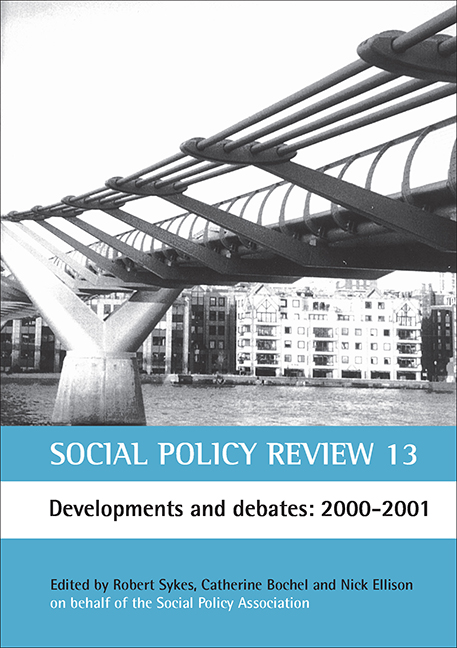ten - New communication technologies – connected welfare: new media and social policy
Published online by Cambridge University Press: 20 January 2022
Summary
In a rapidly changing world in which the effects of the adoption of information and communications technologies (ICTs) are all pervasive, there is a growing recognition that the social diffusion of new media such as the Internet is likely to have a profound effect upon the future provision of welfare services (Loader, 1998; Burrows et al, 2000; Hardey, 1999). Recent policy directives foreground the importance to the UK government of new ICTs for the delivery of social welfare (Blair 2000; Cabinet Office, 2000; DoH, 2000). However, while politicians and policy makers in Britain and around the world are beginning to regard such ICTs as catalysts for modernising public service organisations and procedures, less has been written about the social shaping of the media or its potential impact on the social relations of welfare. In particular, we suggest that the enthusiastic adoption of ICTs for reforming welfare should be considered as an aspect of a contested policy formulation which regards the ‘active citizen’ as the central agent for resolving competing economic, social and political pressures (Williams, 1999). It is the interpretation or understanding of exactly what ‘active citizenship’ means and the values so suggested which affects how the social relations of welfare are changing. At the same time, such differences of interpretation and resulting, and sometimes, conflicting values are reflected in service provision.
This chapter identifies and considers areas where the increasing utilisation of ICTs could be important for influencing the restructuring of welfare provision. By briefly examining the conflicting meanings assigned to the idea of ‘active citizenship’ and the values implicit in the competing perspectives, it will demonstrate how the use of ICTs promote such ideas and the subsequent impacts on social policy. The paper will examine how the use of ICTs could change the way we deliver, construct and experience social policy outcomes. The analysis will concentrate not just on service delivery but, by introducing examples from our own research, will also focus on the notions of democracy and social inclusion, examining the claims that the use of ICTs could bring greater equality and democratic input into policy and decision making.
- Type
- Chapter
- Information
- Social Policy Review 13Developments and Debates: 2000–2001, pp. 207 - 226Publisher: Bristol University PressPrint publication year: 2001
- 1
- Cited by

